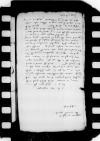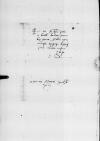List #2409
Ermland (Warmia) Chapter do Ioannes DANTISCUSFrauenburg (Frombork), 1541-03-27
| odebrano Heilsberg (Lidzbark Warmiński), 1541-03-28 Rękopiśmienne podstawy źródłowe:
| ||||
Tekst + aparat krytyczny + komentarzZwykły tekstTekst + komentarzTekst + aparat krytyczny
Reverendissimo in Christo Patri et Domino, domino
Reverendissime in Christo Pater, excellentissime domine antistes, domine gratiose.
Obsequia nostra indefessa cum animorum nostrorum promptitudine Vestrae Reverendissimae Paternitati officiose praemittimus.
Gratiose Domine.
Ex cf.
Reverendissime Domine, putamus ex decoro esse rationes, quas illustris
Officiis et obsequiis nostris in Vestrae Reverendissimae Paternitatis vota ex sententia destinatis libentissime hoc merituri Domino propitio. Qui Vestram Reverendissimam Paternitatem incolumem servet et quam diutissime felicem superesse faciat.
Eiusdem Reverendissimae P(aternitati) or P(aternitatis)⌈P(aternitati)P(aternitati) or P(aternitatis)⌉ Vestrae obsequiosissimi praelati, canonici atque


 BCz, 1599, p. 810
BCz, 1599, p. 810